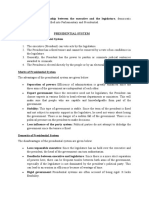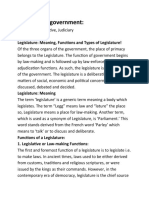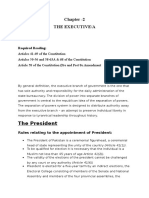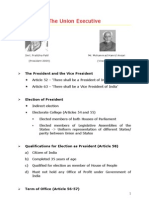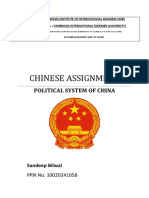Functions of Parliament - Lesson 4
Uploaded by
man downFunctions of Parliament - Lesson 4
Uploaded by
man downDavid Offei Boadu
Functions of Parliament
These are the functions of Parliament:
1. Legislation: Parliament makes laws. It has supreme legislative power in the
UK, it can make, unmake any law it wishes as expressed in the principle of Parliament sovereignty. It can not be challenged Parliaments authority. Devolved assemblies and local assembles can only make laws because Parliament allows them to. Parliament passed the Scotland Act 1998 to devolve some powers to the Scottish Parliament. Private members bills are put forward by MPs and peers. Sometimes the government supports the bill. An example is David Steeles Abortion Act of 1967 was supported by the government. However the effectiveness of Parliament role as a legislature has been questioned. Although the number of private members bill passed increased, the number of private members bill approved is small. Also, party control of the Commons means that the government bills are rarely defeated and most amendments affect the details of legislation, not its principles. It is therefore more accurate to say that legislation is passed through Parliament rather than by Parliament. The lords play a subordinate role in the legislative process. It is a revising chamber that cleans up bills not property scrutinized by the Commons.
2. Recruitment of ministers: Parliament acts as the major channel of
political recruitment. In the UK, all ministers are must be peers or MPs. Before they become front-benchers, they cut their teeth on the backbenchers. This enables them to engage in debate, asking parliamentary questions and sitting in committees. ALSO, it enables them to understand how government works. However, the effectiveness of Parliament as a source of recruitment and training has been questioned. In recent years ministers have been previously personal advisors to former minister or prime minister. The recruitment of ministers has been increasingly drawn from many working from business and other sectors. For example, Ed Miliband, the current Labour leader was previously a personal advisor to Gordon Brown. This is partly because many Mps who build their career in Parliament have limited experience and skills to run a governmental department. Although, they may learn speechmaking skills but they lack management skills which is vital in running a governmental department.
3. Scrutiny and oversight: Parliament does not govern but check or
constrain the government of the day. Many therefore argue that Parliaments most important function is to call the government to account, forcing ministers to explain their actions. This ensures a responsible government. It ensures that
David Offei Boadu unnecessary discrimination does not take place and minorities are not unfairly discriminated against and that laws will clear in their application. In this sense, Parliament acts as a watchdog, exposing any mistakes made by the government. Parliamentary oversight is underpinned by the convention of collective responsibility and individual responsibility. However the effectiveness of Parliament to scrutinize the government has been questioned: If the government of the day control the majority party, it makes it difficult for Parliament to scrutinize the Parliament. The majority party tends to support the government, not scrutinize it. Question time is often weak and ineffective. It has been reduced to once-aweek therefore making it harder for Parliament to hold the ministers especially the prime minister. Prime ministers question time has degenerated into a party-political battle between the prime minister and the opposition leader. It generates more heat than light. Although select committees are seen more effective than Question time, they have some disadvantages. These include: - The government has a majority on the each of these committees (the committees reflect the composition of the House of Commons) - They are appointed by the whips, which ensure that loyal backbenchers sit on key committees and tends to be appointed to the most important committee chairs. - Select committees have no executive power. They only criticise government, they cannot government policy.
4. Representation Parliament is the key link between government and the
people, reflected by the principle of parliamentary democracy. The representative function is mainly carried out by the elected House of Commons and operates through a relationship between MPs and constituents. The Burkean view of representation suggests that MPs use their own judgement in acting on behalf of their constituents. MPs often weigh up their partys attitude to the issue such as Iraq war against what they perceive to be in the nations interest. However, the doctrine of mandate, by contrast, suggests that MPs serve their constituents by toeing the party line. They are elected to represent their party and its manifesto, thus they are expected to toe the party line. Nevertheless there are exceptions, for example during the 2005 general election a large number of Labour candidates openly state that they did not support the Iraq invasion. MPs also are expected to represent their constituents whenever they are involved in government policy. For example, the proposal to set up asylum seekers centres in rural area in 2004-05 was opposed by MPs which affected their constituencies. They set up a successful campaign to reverse the policy. During the 2006-07 debates on the possible introduction of casinos, many MPs opposed it because their constituents were concerned that it will attract crimes in the particular area. (Adjournment debates, early day motions and ten
David Offei Boadu minute rules are protected for MPs to raise questions concerning their constituents). However, the effectiveness of Parliamentary representation has been criticised: - The House of Lords is still unelected, therefore it undermines the democratic responsiveness of Parliament. - The FPTP voting system undermines the effectiveness of representation in the House of Commons. - MPs and Peers are larger unrepresentative of large society.
5. Legitimacy Parliaments final function is to promote legitimacy. When
governments govern through Parliament, their actions are more likely to be seen as rightful and therefore obeyed by the public. Although the government enjoys a mandate from the electorate, it is still important that its authority to legislate is underpinned by Parliament. Therefore, for any law to be implemented it requires parliamentary sanction. This is effectively granting popular consent indirectly. Parliament is in short making legislation legitimate. Parliament stands for the public, being a representative assembly. Parliamentary approval is based on the assumption that the governments actions have been properly scrutinized and debated with any problems and weakness uncovered. For example, the Lords carried out an amendment excluding the Church of England from the Act designed to end discrimination against old, gay and disabled people, during the amendment process of the Equality Bill.
6. Accountability in modern democracy accountability is crucial to prevent
oppressive governments. At election times, the government is directly accountable to the people. Then in 2010, the Labour party popularity ratings dropped from 36.2% to 29.7%. This shows that the people delivered a negative verdict on Labours performance. However, between elections Parliament must force the government to account for its actions. This is done in many ways: - It means forcing the government to justify for its policies by explaining why it was developed and what are their effects. - It may mean criticism of the government policies. This is mainly the job of the opposition. - For the opposition accountability may pave the way to introduce alternatives to government proposals. This represents a more positive form of criticism. - Parliament makes have to uncover mistakes done by ministers in policies developed.
David Offei Boadu
Individual ministerial responsibility- this doctrine suggests that every
minister is individually responsible for all the activities of their department and personal conduct. They face criticism or maybe asked to resign. In the past, ministers resigned even if civil servants made a mistake. However, this principle has eroded in recent years. The most common example is in 1982 when Foreign Secretary Lord Carrington resigned over the Falkland invasion. The British forces were unprepared for the invasion. More recently, Estelle Morris resigned in 2002 over the poor performance of her department. In the same year, Stephen Byers was forced to resign as Trade and Industry Secretary after his personal advisers were accused of behaving unprofessionally. On the other hand, in recent years ministers are more likely to hold on to their positions when serious errors are revealed. In the 1990s, Home Secretary Michael Howard suffered many embarrassing criticisms over his running of prisons. Also, Defence Secretary Geoff Goon refused to resign despite problems with inadequate equipping of British Forces in the 2003 Iraq War. In practise it is up to the prime minister whether a minister takes the rap. Once a minister lost the confidence of his/her prime minister, s/he is likely to be sacked. Nevertheless, most ministers resign over personal conducts. In 2004 Home Secretary David Blunkett resigned following a major parliamentary and media campaign against him. This was partly because a parliamentary inquiry exposed that his office is linked to the speeding up of visa application made by his partners nanny. In the 1990s, the era of Tory sleaze forced the resignation of many Tory ministers. For example, Neil Hamilton, a junior minister, resigned over the cash-for-questions scandal. It is against Parliamentary rules to accept money to raise awareness of an outside groups interests. It is more difficult form ministers to resign over political errors than personal conduct. In practice, Parliament has more influence over the former than the latter. It is therefore more difficult to assert individual ministerial responsibility effectively and has become difficult to assert that it is effective. In practice, ministers accept responsibility for mistakes instead of resigning or embarrassment for the government as a whole. It should be pointed out that Parliament doesnt have the power to remove a minister from office, only the prime minister can. It can only pressure a minister into resignation. Nevertheless, Parliament can remove the government as a whole through a vote of no confidence. However, MPs especially from the governing party are naturally reluctant to precipitate a general election in which many of them may lose their seats. In the end, accountability stops short of resignations and involves normally investigation and criticisms.
David Offei Boadu
How Parliament call ministers to account?
1. Questions to ministers: Prime Ministers Question Time is when MPs ask the prime minister questions (one notified and one unscripted). PMQs tend to be dominated by clashes between the prime minister and the leader of the opposition who asks 4-5 supplementaries. Question Time also extends to other ministers, forcing them to answer oral questions from MPs. Each governmental department features in a four week cycle. Ministers have an unfair advantage (receives help from civil servants). Example: In 2010 the Health Secretary Mike OBrien was criticised for an insufficient funding for health-care participants in the London Olympic games. 2. Select Committees: They have the power to question ministers, their civil servants and any witness from external organisation. Sometimes the chairmen of Select Committees are held by the opposition which shows its ability to be independent from the government. However, the governing party tends to have a large number of MPs in select committees. There are 19 (DSCs) shadowing each work of government departments. Example: In 2010, the Defence Select Committee was headed by James Arbuthnot a conservative MP. It published a report urging future governments to learn the lessons of the Iraq and Afghanistan war to plan a post-peaceful society. 3. Debates and ministerial statements: Government policy can be examined through legislative debates and through emergency debates. These are held by the Speaker. Adjournment debates allow backbenchers to initiate debates at the end of the parliamentary day. Ministers are also required formal statements to Parliament on major policy issues. Example: In July 2010, an adjournment debate on Housing Benefits was held. 4. The Opposition: on opposing days opposition parties choose the subject for debate and use these as opportunities either to criticize government policy or to highlight alternative policies. There are 20 opposing days per parliamentary session.
David Offei Boadu
Powers of Parliament
Reserves Powers: Parliament enjoys two powers that is
rarely used. These are the ability to veto government legislation and to dismiss a government. The House of Lords has vetoed down many government legislation. The Lords vetoed the governments plans to extend the period of detention of terrorists suspects without trial to 90 days. The threat to dismiss a government can force the government to act a responsible and responsive way. However, when a government controls a large majority in the Commons, it is unlikely to happen. Nevertheless, it is comforting to note that Parliament has a way to get rid of arbitrary governments. An example of this is James Callaghans Labour government which lost a vote of no confidence in March 1979.
Specific Lords Powers: the Lord has two powers not
enjoyed by the Commons. The Parliament Act of 1949 gives the Lords the power to delay a bill for next year. This is unlikely to occur in the Commons because MPs are whipped to support government legislations. The Lords, however, has the freedom to defy the government. The purpose of delay is to force the government to think again and so ensure that there is sufficient support for a proposal. Secondly, the delay provides Parliament enough time to amend the proposal. Example: the Hunting Dog Act was delay for the next year by the Lords. The Lords has more opportunity to amend legislations than the Commons. The former has greater political independence than the Commons. Also, the Lords amendment has the effect of delaying legislation. But each amendment must be approved by the House of Commons. However, if both Houses disagree, a bill is passed back and forward (causing pingpong), which tends to frustrate the government. Example: the 2001 Anti-Terrorism Act had been declared unlawful under the ECHR. This forced the government to return the legislation to Parliament in a modified form. But the Lords decide to add some critical amendments, preventing the Home Office from detaining suspected terrorists without trial. The legislation was passed back and forth until the government agreed on a compromise.
David Offei Boadu
The Functions of Parliament Functions Limitations
Private members legislation Deliberation Calling government to account The House of Lords is not elected. The Commons is seen to be dominated by the executive and therefore not independent. The electoral system means the Commons is not politically representative of the electorate. Little time is devoted to private members legislation. Government is easily able to kill any bills it opposes. It is difficult for MPs and peers to gather enough support to force bill through. Both Houses lack enough time consider bills thoroughly. Standing committees are whipped so fall under government control. Collective government responsibility makes it difficult to examine government decisions. The opposition lacks the administrative back-up of the government. Skilful minister and civil servants can evade questioning by MPs and peers. MPs and peers may lack expertise and knowledge. The power of patronage prevents governing MPS and peers being too hostile or inquisitive. Therefore, governing MPs are like to scrutinize the government less effectively. There remains a good deal of government secrecy, especially in the field of defence, security and foreign policy. Parliament is traditionally not expected to challenge the government seriously in this area. House of Lords has no jurisdiction at all. The FPTP voting system makes the Commons largely unrepresentative. The House of Lords is unelected. Both houses are socially unrepresentative, especially in terms of women or social and ethnic background. MPs of the governing party are reluctant to use reserve powers for fear of precipitating a general election in which they may lose their seats or their party may lose
Financial control Redress of grievances Reserves powers
Representation
David Offei Boadu power. Legislative committees are whipped and rarely defy government. The Parliament Act limits this power to one year. Proposed amendments must be approved by the House of Commons, where government dominates. This is partly because the House of Lords is not elected but the Commons are, therefore it is only the Commons who can make legislation legitimate.
Scrutiny of proposed legislation. Delaying (House of Lords) Amending ( House of Lords)
You might also like
- Benno Artmann Euclid-The Creation of MathematicsNo ratings yetBenno Artmann Euclid-The Creation of Mathematics350 pages
- Senate of USA Most Powerful Second Chamber in The World100% (2)Senate of USA Most Powerful Second Chamber in The World3 pages
- The Iranian Political System: A Very Brief HistoryNo ratings yetThe Iranian Political System: A Very Brief History4 pages
- System of Government: China Has A Semi-Presidential Form of GovernmentNo ratings yetSystem of Government: China Has A Semi-Presidential Form of Government2 pages
- Rousseau's Cocept of Popular SovereigntyNo ratings yetRousseau's Cocept of Popular Sovereignty7 pages
- What Are The Main Characteristics of Parliamentary System?No ratings yetWhat Are The Main Characteristics of Parliamentary System?2 pages
- Prime Minister and Its Powers and FunctionsNo ratings yetPrime Minister and Its Powers and Functions2 pages
- POSDCORB - Wikipedia, The Free EncyclopediaNo ratings yetPOSDCORB - Wikipedia, The Free Encyclopedia5 pages
- Module 1, PPT, Class 9, Civics Lesson 3 Electoral Politics PPT3No ratings yetModule 1, PPT, Class 9, Civics Lesson 3 Electoral Politics PPT324 pages
- Branches of Government:: Legislature: Meaning, Functions and Types of Legislature!No ratings yetBranches of Government:: Legislature: Meaning, Functions and Types of Legislature!11 pages
- Constitution of India: Salient Features and CharcteristicsNo ratings yetConstitution of India: Salient Features and Charcteristics11 pages
- Power and Function of The President of India. How It Is Affected by JudicialNo ratings yetPower and Function of The President of India. How It Is Affected by Judicial7 pages
- The Concept of World Community and World Government100% (1)The Concept of World Community and World Government6 pages
- Public Administration in Developing WorldNo ratings yetPublic Administration in Developing World5 pages
- Role of Prime Minister and President of Pakistan100% (2)Role of Prime Minister and President of Pakistan5 pages
- The Election Commission and Role To Democracy in Bangladesh AssignmentNo ratings yetThe Election Commission and Role To Democracy in Bangladesh Assignment3 pages
- Functions of Legislature - Important IndiaNo ratings yetFunctions of Legislature - Important India8 pages
- Lecture Notes Presidential Form of GovernmentNo ratings yetLecture Notes Presidential Form of Government11 pages
- Salient Features of British Constitution: I) UnwrittenNo ratings yetSalient Features of British Constitution: I) Unwritten3 pages
- Parliamentary & Presidential Form of GovernmentNo ratings yetParliamentary & Presidential Form of Government12 pages
- Lecture Points Unitary Form of GovernmentNo ratings yetLecture Points Unitary Form of Government5 pages
- Compare The Constitutional and Democracy of Britain and China (Autorecovered)No ratings yetCompare The Constitutional and Democracy of Britain and China (Autorecovered)8 pages
- Silent Features of Constitution of 1973 PDFNo ratings yetSilent Features of Constitution of 1973 PDF3 pages
- State of The Administrative Accountability in Bangladesh100% (3)State of The Administrative Accountability in Bangladesh9 pages
- 1) Power and Function of The ParliamentNo ratings yet1) Power and Function of The Parliament51 pages
- The adoption of parliamentary system in Pakistan…100% (1)The adoption of parliamentary system in Pakistan…2 pages
- In What Ways, If Any, Is The UK Parliament More Than The Instrument of Party LeadersNo ratings yetIn What Ways, If Any, Is The UK Parliament More Than The Instrument of Party Leaders4 pages
- Black and White Vintage Newspaper Motivational Quote Poster (9 x 12 in)No ratings yetBlack and White Vintage Newspaper Motivational Quote Poster (9 x 12 in)2 pages
- Fabships: Off-Grid Maker Spaces For A Better WorldNo ratings yetFabships: Off-Grid Maker Spaces For A Better World4 pages
- 07 GMGT 2070 - Bad Apples & Good Citizens at WorkNo ratings yet07 GMGT 2070 - Bad Apples & Good Citizens at Work27 pages
- Republic of The Philippines Isabela State University Cabagan, IsabelaNo ratings yetRepublic of The Philippines Isabela State University Cabagan, Isabela23 pages
- Paytm Wallet TXN HistoryJan2020 9369204281 PDFNo ratings yetPaytm Wallet TXN HistoryJan2020 9369204281 PDF2 pages
- A Thousand Splendid Suns: Khaled HosseiniNo ratings yetA Thousand Splendid Suns: Khaled Hosseini11 pages
- Contributions of women and students in the freedom movement for separate homeland for Muslims of British IndiaNo ratings yetContributions of women and students in the freedom movement for separate homeland for Muslims of British India2 pages
- An Act Proposing The Creation of Dr. Juan C. Angara MunicipalityNo ratings yetAn Act Proposing The Creation of Dr. Juan C. Angara Municipality3 pages
- Senate of USA Most Powerful Second Chamber in The WorldSenate of USA Most Powerful Second Chamber in The World
- The Iranian Political System: A Very Brief HistoryThe Iranian Political System: A Very Brief History
- System of Government: China Has A Semi-Presidential Form of GovernmentSystem of Government: China Has A Semi-Presidential Form of Government
- What Are The Main Characteristics of Parliamentary System?What Are The Main Characteristics of Parliamentary System?
- Module 1, PPT, Class 9, Civics Lesson 3 Electoral Politics PPT3Module 1, PPT, Class 9, Civics Lesson 3 Electoral Politics PPT3
- Branches of Government:: Legislature: Meaning, Functions and Types of Legislature!Branches of Government:: Legislature: Meaning, Functions and Types of Legislature!
- Constitution of India: Salient Features and CharcteristicsConstitution of India: Salient Features and Charcteristics
- Power and Function of The President of India. How It Is Affected by JudicialPower and Function of The President of India. How It Is Affected by Judicial
- The Concept of World Community and World GovernmentThe Concept of World Community and World Government
- The Election Commission and Role To Democracy in Bangladesh AssignmentThe Election Commission and Role To Democracy in Bangladesh Assignment
- Salient Features of British Constitution: I) UnwrittenSalient Features of British Constitution: I) Unwritten
- Compare The Constitutional and Democracy of Britain and China (Autorecovered)Compare The Constitutional and Democracy of Britain and China (Autorecovered)
- State of The Administrative Accountability in BangladeshState of The Administrative Accountability in Bangladesh
- In What Ways, If Any, Is The UK Parliament More Than The Instrument of Party LeadersIn What Ways, If Any, Is The UK Parliament More Than The Instrument of Party Leaders
- Black and White Vintage Newspaper Motivational Quote Poster (9 x 12 in)Black and White Vintage Newspaper Motivational Quote Poster (9 x 12 in)
- Fabships: Off-Grid Maker Spaces For A Better WorldFabships: Off-Grid Maker Spaces For A Better World
- Republic of The Philippines Isabela State University Cabagan, IsabelaRepublic of The Philippines Isabela State University Cabagan, Isabela
- Contributions of women and students in the freedom movement for separate homeland for Muslims of British IndiaContributions of women and students in the freedom movement for separate homeland for Muslims of British India
- An Act Proposing The Creation of Dr. Juan C. Angara MunicipalityAn Act Proposing The Creation of Dr. Juan C. Angara Municipality













